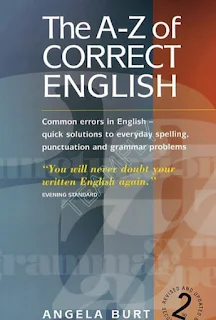 |
| The A-Z of Correct English |
DESCRIPTION
The A-Z of Correct English
refers to a comprehensive guide or reference book that covers various aspects
of the English language, including grammar, punctuation, spelling, and usage.
While there isn't a single universally recognized "A-Z of Correct English,"
I can provide you with a list of topics, rules, and guidelines typically
covered in such a resource:
A - Adjectives: How to use
them correctly to describe nouns.
B - Capitalization: Rules for
capitalizing words in sentences.
C - Comma usage: Guidelines
for using commas in sentences.
D - Dangling modifiers: How to
avoid this common grammatical error.
E - End punctuation: Rules for
using periods, question marks, and exclamation points.
F - Fragments and run-on
sentences: How to identify and correct them.
G - Gender-neutral language:
Tips for using inclusive language.
H - Homophones: Words that
sound the same but have different meanings and spellings.
I - It's vs. its:
Understanding the difference between the contraction and possessive pronoun.
J - Jargon: Avoiding
unnecessary technical language and industry-specific terms.
K - Keep it concise: Tips for
writing clear and concise sentences.
L - Lay vs. lie: Knowing when
to use each verb correctly.
M - Misplaced modifiers: How
to place modifiers correctly in sentences.
N - Noun-verb agreement:
Ensuring that subjects and verbs agree in number.
O - Oxford comma:
Understanding the controversy and when to use it.
P - Prepositions: Common
prepositions and how to use them.
Q - Quotation marks: Rules for
punctuating and formatting quotes.
R - Redundancy: Avoiding
unnecessary repetition in writing.
S - Subject-verb agreement:
More on ensuring proper agreement.
T - Tense consistency:
Maintaining consistent verb tenses in a sentence.
U - Usage mistakes: Common
English usage errors to watch out for.
V - Verb conjugation: How to
conjugate verbs correctly in various tenses.
W - Word choice: Selecting the
right words for your writing.
X - Xenophones: Words borrowed
from other languages and their usage.
Y - Your vs. you're:
Understanding the difference between the possessive and contraction.
Z - Zeugma: A literary device
involving the use of one word to modify or govern two or more words, often in
an unexpected way.
